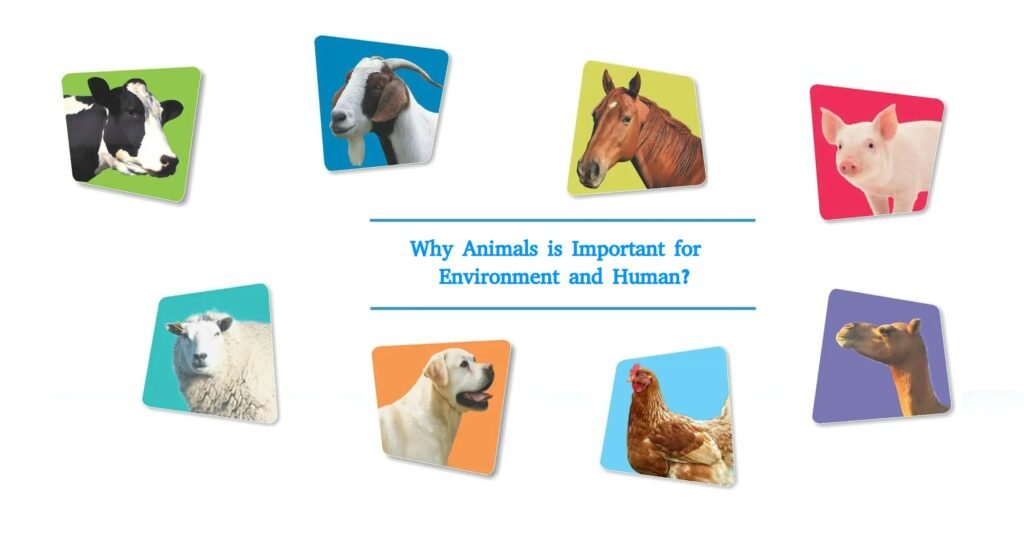Animals play a crucial role in maintaining the balance and health of our environment. From the smallest insects to the largest mammals, every species has its own unique contribution to the ecosystem. In addition to their environmental significance, animals also have a significant impact on human well-being. Let’s explore why animals are important for both the environment and humans.
The impact of human activities on the environment has had a significant impact on animal populations around the world. Pollution, deforestation, habitat destruction, and climate change are just a few of the threats that animals face. These threats can lead to a decline in animal populations, a loss of biodiversity, and even extinction.

Learn about the importance of animals for the environment and humans. Animals play a crucial role in maintaining the balance and health of our environment. They contribute to biodiversity, ecosystem stability, nutrient cycling, soil fertility, and provide economic benefits. Interacting with animals also has emotional and psychological benefits. Animals raise awareness about conservation and environmental issues, serving as indicators of ecosystem health. Recognizing and appreciating the importance of animals is crucial for the sustainability of our planet and the overall welfare of humanity.
Animals play a vital role in the environment and are essential for human survival. They provide a variety of services, including pollination, pest control, waste management, and nutrient cycling. Additionally, animals are a source of food, fiber, and medicine for humans. In this essay, we will explore the importance of animals for the environment and humans.
1. Biodiversity and Ecosystem Stability
Animals are an integral part of the Earth’s biodiversity. Biodiversity refers to the variety of plant and animal species present in an ecosystem. A diverse range of animals is essential for maintaining the stability and resilience of ecosystems. Each species has its own role to play, whether it is pollinating plants, dispersing seeds, or controlling populations of other organisms.
For example, bees and butterflies are important pollinators that facilitate the reproduction of flowering plants. Without them, many plant species would struggle to reproduce, leading to a decline in food sources for other animals. Similarly, predators help control the population of herbivores, preventing overgrazing and maintaining the balance of plant communities.
2. Nutrient Cycling and Soil Fertility
Animals also contribute to nutrient cycling and soil fertility. Many animals, such as earthworms and beetles, break down organic matter and recycle nutrients back into the soil. This process, known as decomposition, helps replenish essential nutrients needed for plant growth.
Furthermore, animals play a crucial role in the formation of fertile soil through their waste. Animal droppings contain valuable nutrients that enrich the soil and promote the growth of plants. This cycle of nutrient transfer from animals to plants and back to animals again is vital for maintaining healthy ecosystems.
3. Economic Benefits
Animals provide numerous economic benefits to humans. They support various industries such as agriculture, tourism, and pharmaceuticals. Livestock, for instance, is a primary source of meat, milk, and other animal products that form a significant part of our diet.
In addition, wildlife tourism is a booming industry that generates revenue and employment opportunities. Many people travel to observe and appreciate animals in their natural habitats, contributing to local economies. Furthermore, animals serve as a source of inspiration for scientific research, leading to the development of new medicines and technologies.
4. Emotional and Psychological Well-being
Animals have a profound impact on human emotional and psychological well-being. Interacting with animals, whether as pets or in wildlife sanctuaries, has been shown to reduce stress, anxiety, and depression. Pets, in particular, provide companionship and unconditional love, improving the overall quality of life for many individuals.
Studies have also demonstrated the therapeutic effects of animals on mental health. Animal-assisted therapy, for example, involves the use of trained animals to assist individuals with physical or mental health conditions. The presence of animals can help reduce pain, improve social interactions, and enhance overall emotional well-being.
5. Conservation and Environmental Education
Animals play a crucial role in raising awareness about conservation and environmental issues. Iconic species like elephants, tigers, and whales capture our imagination and inspire us to protect their habitats. Conservation efforts aimed at preserving these species often lead to the preservation of entire ecosystems.
Furthermore, animals serve as indicators of ecosystem health. Changes in animal populations or behavior can alert scientists to environmental problems such as pollution or habitat loss. By studying animals, we can gain valuable insights into the state of our environment and take necessary actions to mitigate threats.
Conclusion
Animals are not only important for the environment but also for human well-being. Their role in maintaining biodiversity, nutrient cycling, and ecosystem stability cannot be overstated. Additionally, animals provide economic benefits, contribute to emotional and psychological well-being, and play a vital role in conservation and environmental education. Recognizing and appreciating the importance of animals is crucial for the sustainability of our planet and the overall welfare of humanity.




